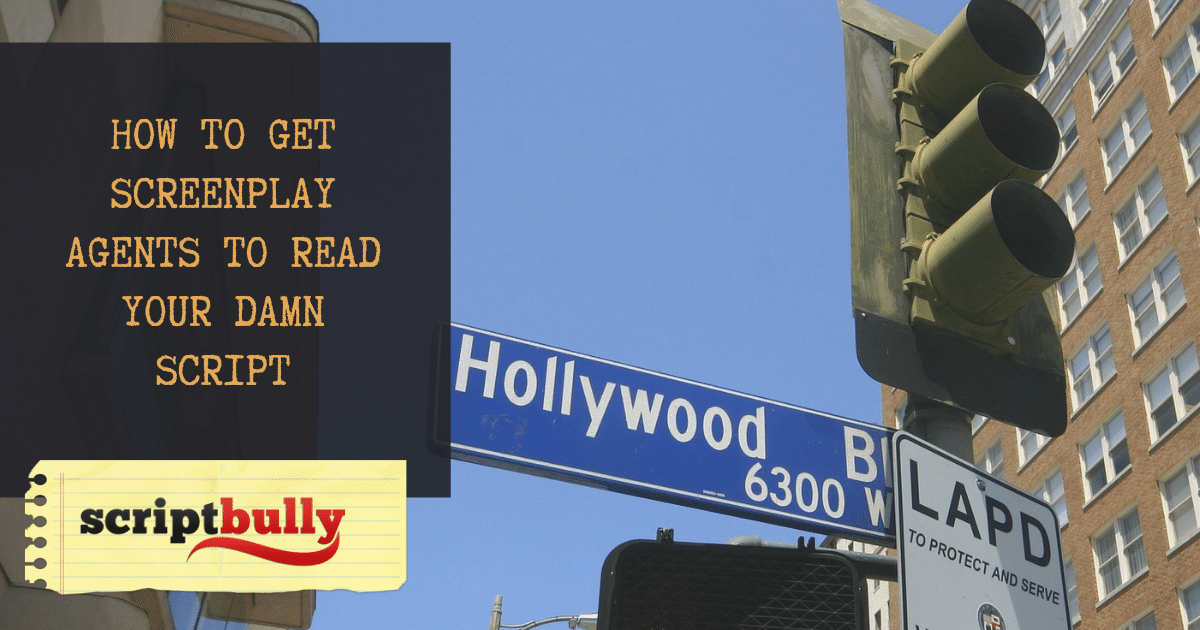Getting screenplay agents (or their receptionist) to return your call is hard enough…but how do you get them to read your script. (Or even possibly buy the damn thing.)
Here are 7 film-industry insiders offering their most sage-like advice on how to get screenplay agents to read your script…and get that much closer to FINALLY selling that story of yours.
The Art Getting Screenplay Agents to Read Your Script
Tip #1: Use Your Contacts
“You don’t have to be best friends with Apatow or Franco, you just need to know their interns or assistants. Because the name of the game is getting champions of your writing. If an intern for a high powered producer reads and loves your script, and believes wholeheartedly that This Is The Next Big Thing, he’ll lobby hard to get his boss to read it. He or she will fight for you, and for the script. Why? Well, frankly it makes them look good to their bosses that they found the material, and they can parlay that into more opportunities for themselves. Many an assistant at an agent’s desk got promoted for being able to find talent – and many an intern has gotten associate producer credits from bringing in a script. So as long as you have a champion – at any level in the company – in your corner, you’re ahead of the game.”
-Michael Ferris, former Hollywood Literary Manager and starter of ScriptaWish.com
http://www.scriptmag.com/features/magic-bullet-how-to-get-your-script-read
It’s a well-known fact that to break into the business you need to know the right people, but that doesn’t mean you need to be the offspring of Tom Hanks to get noticed. Use whatever contacts you’ve got and if you don’t have any make some however you can. Make them fans of your work and if they’re passionate about what you offer them, they’ll help you get ahead since it’ll help them too.
Tip #2: Get Creative with How You Make Connections
“Aspiring screenwriters should also make connections with like-minded people, as [Sean] Covel [(Hollywood Producer)] notes when he talks about meeting filmmakers in line for screenings at Sundance. I would argue that your filmmaking peers are your biggest allies in moving your career forward, working together on each other’s projects, learning along the way, and getting better at your craft until someone with connections takes notice.”
-Christopher Boone, a screenwriter and director who was a screenwriting semifinalist for his screenplay entered in the Academy Nicholl Fellowship in Screenwriting
http://nofilmschool.com/2013/08/how-aspiring-screenwriters-get-screenplay-read
Not only should you try to get in an in at a studio or agency, but get creative in who you get to know as well. Festivals will be trolling with people in the business. Online forums are a great place to become acquainted with your fellow peers too. Make as many connections as you can and one might lead to an agent reading your words.
Tip #3: Get Script Coverage
“There are a couple things you need to know about script coverage before you jump in. First, agents, managers, producers and executives review script coverage for all submitted scripts on a daily basis. Based on script coverage alone, decision-makers will decide which screenplays they want to read first, put on a pile to read later or pass on (reject) without reading the screenplay…When I was an executive, I passed on hundreds of scripts based solely on the script coverage. That is standard practice for all agents, managers, producers and executives…Getting positive script coverage is the one of the many “gates” that a great project must pass through to get read by a decision-maker.”
-Stephanie Palmer, former MGM Pictures executive and best-selling author
http://goodinaroom.com/blog/script-coverage
It’ll mean paying for the services provided, but many experts really value script coverage for getting your screenplay through the preliminary steps in order to be read. Many agents rely on the coverage to let them know if the screenplay is what they’re looking for or if it sounds interesting BEFORE actually reading a single page of your script. Good coverage means your work gets placed in the “To Read” pile, not the trash can.
Tip #4: Enter Contests
“Sometimes you don’t even have to win the contest. Industry pros are usually judges for the upper level contests and entering your script may be your best chance of having it read by someone in a position to help get it sold. Even if you don’t win.”
-Mario O. Moreno, Story Specialist for The Writers Store
http://www.scriptmag.com/features/columns/can-screenwriting-contests-advance-your-career
Of course there are scam contests out there, but it’s not hard to find the contests that are reputable. If you have entry-fee money to spare, contests are great to get your screenplay read by people in the industry. If you’ve entered a good contest and the judges like it and it places, the chances of it getting to the eyes of agents increase substantially.
Tip #5: Send Effective Query Letters
“Query letters can be an effective way to catch the attention of someone at a production company or talent agency. Contrary to popular myth, query letters are most often opened and read. It is true, however, that the majority of them land in the trash. But this occurs simply because the concept presented does not entice the reader. Even a well written logline can be discarded if the concept being pitched is not to the reader’s taste or the preferred genre (for example). Only a handful of letters will catch the attention of a producer or agent. The bigger the production company and agency, the harder it will be. The writer’s job is not to second guess who may and may not be receptive to a query letter. This is counterproductive and undermines the process. The writer should craft a brief but effective query letter to anyone he pleases.”
-J Gideon Sarantinos, Film and TV writer and story consultant
https://gideonsway.wordpress.com/2012/03/06/what-agents-look-for-in-a-query-letter
Despite what many believe, query letters can still be an effective way to get your screenplay into the hands of agents, you just have to do it right. Make sure you follow all the “query” rules and above all else, have a perfect logline. Inevitably, you’ll receive many rejections and your letter will find many a trashcan, but if your letter is succinct and your logline strong enough, someone eventually may be interested. It definitely never hurts to send these out!
Tip #6: Get An Internship
“So, you’re working for your internship… how do you stand out? First and foremost, if you work extra super hard, you WILL be noticed. Make sure that when you finish a task, you ask if there’s anything else you can do. When given one thing, volunteer for four more. If they don’t have anything else for you, go around asking other people if they need anything done for them. Be quick when given a task, but always double check to make sure it’s well done. Being the go-to intern will quickly make yourself indispensable and dependable, and you will begin to stand out from the crowd of others.”
-Michael Ferris, former Hollywood Literary Manager and starter of ScriptaWish.com
http://www.scriptmag.com/features/magic-bullet-how-to-get-your-script-read
It may be a bit drastic depending on your financial situation, but internships are a great way to get in the door and get noticed by agents. Taking an unpaid internship and being the uber-effective-worker that you are will help you stand out. This can allow you to network with the best and establish relationships with the people who can help you down the line.
Tip #7: Have More Than One Script
“Why ‘more than one script’? That is because if someone reads work of yours and thinks you have promise, their next request (to confirm the initial impression) is very often, ‘Can you send me another spec?’ If you can’t, that is by no means a dealbreaker. But if you CAN, and the second script is equally hot, that could be a dealmaker! The second script needs to be structurally sound, as well.”
-Donna Michelle Anderson, executive producer of Tidal Wave TV and former film story analyst
Let’s say you’ve taken all the experts advice, your screenplay has reached the eyes of an agent and guess what!? THEY LOVE IT. They believe in you as a writer, but to confirm it and verify that your one good idea wasn’t a fluke, they ask for another script to read. Do you have one? You better if you want to snag yourself one of those elusive – but ultimately profitable – screenwriting agents.
What’s Your Screenwriter Take?
Have you had any luck getting screenplay agents to look at your material? Let us know how you did it in the comments below.






